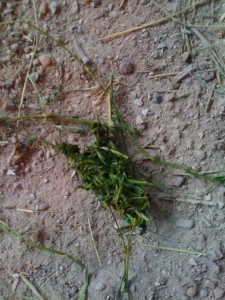Have you ever found bits of wadded up, chewed hay laying around the feed area and wondered about the health of your horses teeth? This is called quidding and if you are seeing it then most likely you have an older horse who has lost most of his teeth, a horse that recently had his teeth floated, a horse with sore teeth or a horse with pain or dysfunction in his jaw joint or TMJ.
In the older horse that has had good dental care don’t worry about the wads. In older horses teeth wear out and all you can do at that point is keep the sharp points off of them and make sure remaining teeth don’t irritate the opposing gums. Your horse is getting some nutrition from gumming the hay but he is smart not to swallow what he can’t chew. If he swallowed the partially chewed hay he could choke or colic. Make sure he is getting other forms of fiber he can swallow such as beet pulp, wheat bran or chopped hay. Often these horses can digest fresh, green grass. I like to give these horses extra digestive support in the form of daily packets of bluegreen algae, probiotics, and enzymes so they get the most out of the food they can swallow.
Sometimes when horses teeth are floated, some of the rough ridges are removed and this will interfere with proper hay chewing. This should not last more than a few days after the float. When the horse continues to spit out hay it could indicate the teeth were excessively floated or he could have a sore TMJ from having his mouth open wide during the float.
TMJ pain can come from horses teeth being floated and having the mouth speculum opened too wide or for too long. TMJ pain can also show when a horse loses muscle tone in the chewing muscles. Pain on one side of the horses teeth will cause uneven chewing, leading to TMJ pain. TMJ pain can come from injuries directly to the jaw and because many acupuncture meridians pass over this area, from other parts of the body as well.
So don’t panic when you see evidence of quidding but do ask why and fix it if you can. Madalyn

Pingback: uberVU - social comments